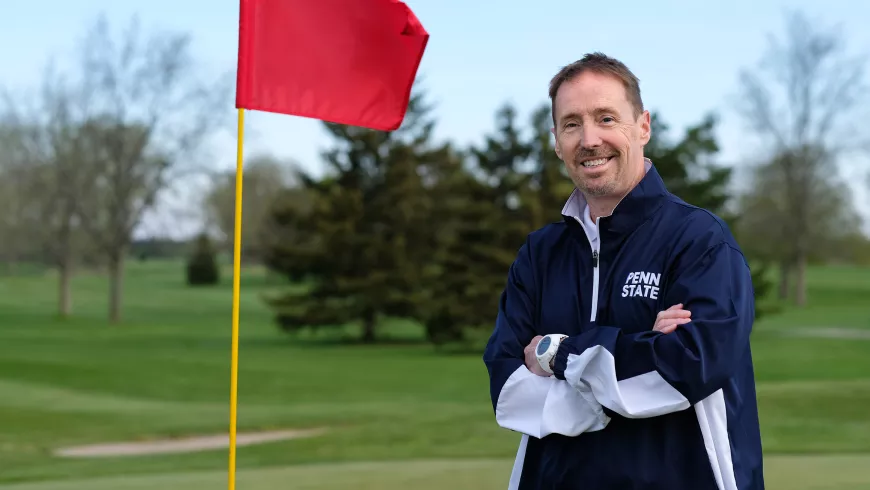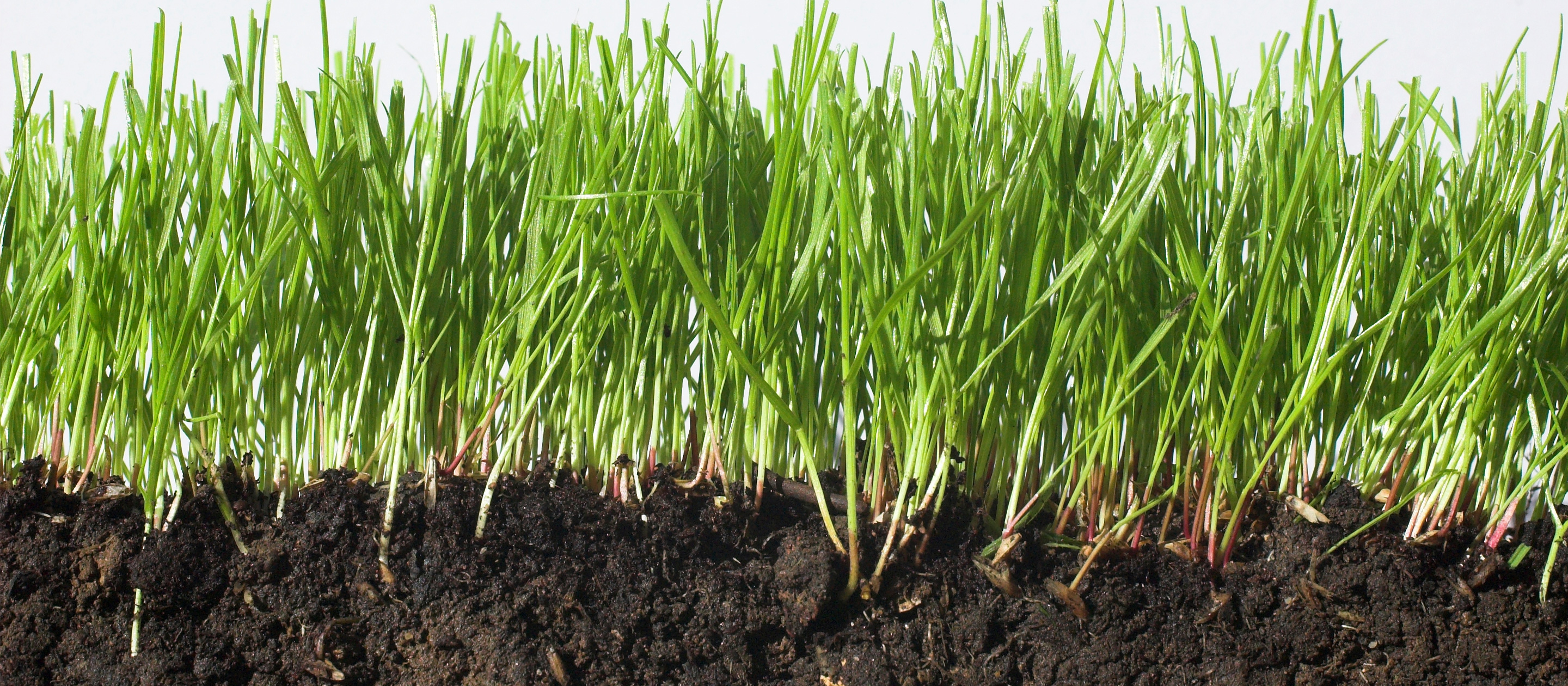Application deadline
Credits and costs
Gain Valuable Hands-On Experience
Receive real-world experience through an internship.
Gain the Skills Needed to Manage Turfgrass Operations
Devise methods of inquiry to distinguish cause and effect and to solve relevant problems in turfgrass management.
Interpret and make scientific decisions related to managing turfgrass under various conditions using the fundamentals of plant and soil sciences.
Comprehend and draw appropriate inferences from numeric data and quantitative models.
Demonstrate proficiency in the primary turfgrass cultural practices including mowing, fertilization, and irrigation and the secondary practices including cultivation, pest management, and soil modification.
Study in a Variety of Online Courses
Study in a Variety of Online Courses
This 61-credit associate degree includes courses in biology, chemistry, and ethics, along with core curriculum courses such as turf and ornamental weed control, turfgrass insect pest management, and turfgrass pesticides.
Requirements for the Major (61 credits)
This includes 15 credits in General Education courses:
- 6 credits in GN courses
- 3 credits in GQ courses
- 3 credits in GWS courses
- 3 credits of GH courses
A student enrolled in this major must receive a grade of C or better in all courses required for the major.
Prescribed Courses (31 credits)
- 3credits
An introduction to fundamental biological topics (including cells, energy transduction, genetics, evolution, organismal structure/function, ecology) for non-majors biology-related fields.
- GN
The credits earned in this course may be applied toward the Natural Sciences (GN) requirement.
- 3credits
Introduction to organic chemistry, with emphasis on the properties of organic compounds of biochemical importance.
- Prerequisite
CHEM 101 or CHEM 106 or CHEM 110 or CHEM 110H or CHEM 130
- 3credits
An intensive, rhetorically based experience in reading and writing that will prepare you both to understand the communications that surround you and to succeed in your own communication efforts.
- Prerequisite
ENGL 4 or satisfactory performance on the English placement examination
- GWS
The credits earned in this course may be applied toward the Writing/Speaking (GWS) requirement.
- 3credits
Introduction to entomology and management of insect pests of cold- and warm-season turfgrass.
- Prerequisite Concurrent
TURF 235
- 3credits
Quadratic equations; equation in quadratic form; word problems; graphing; algebraic fractions; negative and rational exponents; radicals.
- Prerequisite
MATH 4 or satisfactory performance on the mathematics placement examination.
- 3credits
Ethical theory about virtue, duty, autonomy, and life quality applied to moral problems, including character, violence, oppression, abortion, and suicide.
- Prerequisite
ENGL 15 or ENGL 30
- GH
The credits earned in this course may be applied toward the Humanities (GH) requirement.
- 3credits
A study of soil properties and processes and relationships to land use, plant growth, environmental quality, and culture.
- GN
The credits earned in this course may be applied toward the Natural Sciences (GN) requirement.
- 1credit
Covers chemical toxicity, formulations, environmental fate, labels, MSDS, calibration, IPM, safety, handling, storage, and Pennsylvania certification and regulations.
- 3credits
Characterization of the primary plant species used for sports, lawn and utility turf; includes turfgrass morphology, environmental adaptation, and cultural requirements.
- 3credits
Introduction to the development of integrated weed management strategies utilizing a variety of cultural and chemical methods.
- 3credits
Supervised off-campus, nongroup instruction including field experience, practica, or internships. Written and oral critique of activity required.
- Prerequisite
Prior approval of proposed assignment by instructor.
Additional Courses (select 3 credits)
- 3credits
First semester of a two-semester, comprehensive general chemistry course that introduces students to the basic principles of chemistry with an emphasis on the relationships between the microscopic structure and the macroscopic properties of matter.
- Prerequisite
Completion of or placement beyond MATH 22
- or:3credits
This course is a one-semester rigorous college-level introductory Chemistry course covering the fundamental principles of general, organic, and biochemistry. One year of high school chemistry is strongly recommended.
- Prerequisite
Completion or placement beyond MATH 21
Supporting Courses (18 credits)
Professional Agriculture — 9 credits
Professional Management and Economics — 9 credits
General Education Requirements
Some General Education requirements may be satisfied by courses required for the major. Students should work with an adviser to select courses.
- Arts (GA): 3 credits
- Humanities (GH): 3 credits
- Natural Sciences (GN): 3 credits
- Social and Behavioral Sciences (GS): 3 credits
- Writing and Speaking (GWS): 3 credits
- Quantification (GQ): 3 credits
- Any General Education course, including Integrative Studies (Inter-domain or Linked courses): 3 credits
- United States Cultures (US), or International Cultures (IL) or combined designation (US; IL): 3 credits
May be satisfied by designated courses that also meet other degree or General Education requirements. - Writing Across the Curriculum (W, M, X, Y): 3 credits
May be satisfied by designated courses that also meet other degree or General Education requirements.
Course Availability
If you're ready to see when your courses will be offered, visit our public LionPATH course search (opens in new window) to start planning ahead.
Start or Advance Your Career

Start or Advance Your Career
This program was created for golf course and sports field professionals who want to earn a college degree. You can use the knowledge gained from this program and the support of Penn State career resources to pursue careers in a variety of fields, depending on your goals.
Job Titles Related to This Degree
As a student in this associate degree program, you can earn credits while working toward advancement in a variety of areas, including:
- Grounds Crew Supervisor
- Grounds Foreman
- Groundskeeper
- Integrated Pest Management Technician (IPM Technician)
- Lawn Service Supervisor
- Lawn Technician
Employment Outlook for Occupational Fields Related to This Degree
Estimates of employment growth and total employment are provided by the U.S. Bureau of Labor Statistics and are subject to change. While these occupations are often pursued by graduates with this degree, individual outcomes may vary depending on a variety of factors. Penn State World Campus cannot guarantee employment in a given occupation.
Landscaping and Groundskeeping Workers
First-Line Supervisors of Landscaping, Lawn Service, and Groundskeeping Workers
Pesticide Handlers, Sprayers, and Applicators, Vegetation
Career Services to Set You Up for Success

From the day you're accepted as a student, you can access resources and tools provided by Penn State World Campus Career Services to further your career. These resources are beneficial whether you're searching for a job or advancing in an established career.
- Opportunities to connect with employers
- Career counselor/coach support
- Occupation and salary information
- Internships
- Graduate school resources
Upcoming Events
Ready to Learn More?
Get the resources you need to make informed decisions about your education. Request information on this program and other programs of interest by completing this form.
Ready to take the next step toward your Penn State associate degree?
Costs and Financial Aid
Costs and Financial Aid
Learn about this program's tuition, fees, scholarship opportunities, grants, payment options, and military benefits.
Costs and Financial Aid
Undergraduate Tuition
Undergraduate tuition is calculated based on the number of credits for which you register and the number of total credits you have accrued at or transferred to Penn State.
Tuition is due shortly after each semester begins and rates are assessed every semester of enrollment.
2025–26 Academic Year Rates
| How many credits do you plan to take per semester? | If you have 59 or fewer credits | If you have 60 or more credits |
|---|---|---|
| 11 or fewer | $638 per credit | $685 per credit |
| 12–19 | $7,755 per semester | $8,371 per semester |
Undergraduate students taking more than 19 credits will be charged the flat tuition rate plus the regular per credit hour rate for each credit above 19.
Financial Aid and Military Benefits
Some students may qualify for financial aid. Take the time to research financial aid, scholarships, and payment options as you prepare to apply. Federal financial aid may only be used to pay for credits used to satisfy program requirements.
Military service members, veterans, and their spouses or dependents should explore these potential military education benefits and financial aid opportunities, as well.
Additional Cost of Attendance Details
To view the detailed list of cost of attendance elements:
- visit the Tuition Information site
- click the plus sign to expand the table
- select a semester from the World Campus row
Earn a Valuable Credential along the Way

Earn a Valuable Credential along the Way
Show mastery of specific subjects before your degree is complete. Thanks to shared courses across programs, students can often earn a certificate along with their degree in less time than if they earned them separately.
Certificate Program Related to This Degree
Some of the courses earned in the basic and advanced certificates will apply toward satisfying the 31 major course credits requirement in the associate degree, but it is not possible to earn either certificate completely within the associate degree.
Progress toward the following certificate can be earned while completing this degree program:
Build upon your existing skills and explore more advanced turfgrass topics, such as pest management, turfgrass cultural systems, turfgrass edaphology, and case studies in turfgrass management with this certificate.
Learn more about the Undergraduate Certificate in Turfgrass Management, AdvancedA Head Start toward a Bachelor’s Degree

A Head Start toward a Bachelor’s Degree
Not only can this program help create opportunities in your career, it can also give you a solid head start toward a full bachelor’s degree.
Bachelor's Degree Program Related to This Associate Degree
Some or all credits earned for this certificate can be applied to the following Penn State World Campus degree program:
Begin your career in turfgrass management with a comprehensive education in pest and disease identification and management, soil science, and other horticultural processes. Learn the fundamental operations of golf courses, athletic fields and sports turf, parks, and other related turf industries.
Learn more about the Bachelor of Science in Turfgrass ScienceWho Should Apply?
If you have an interest in the turf industry or already have work experience — whether at golf courses, sports facilities, turf management, or other venues — the Associate in Science in Turfgrass Science and Management can give you the skills and advantage you need to move your career forward.
Set Your Own Pace

Set Your Own Pace
Whether you are looking to finish your program as quickly as possible or balance your studies with your busy life, Penn State World Campus can help you achieve your education goals. Many students take one or two courses per semester.
Our online courses typically follow a 12- to 15-week semester cycle, and there are three semesters per year (spring, summer, and fall). If you plan to take a heavy course load, you should expect your course work to be your primary focus and discuss your schedule with your academic adviser.
To Finish Your Degree in One to Two Years
- Take 4–5 courses each semester
To Finish Your Degree in Three or More Years
- Take 2–3 course each semester
Timelines may vary for students transferring credits from another school or based on course availability.
Convenient Online Format
This program's convenient online format gives you the flexibility you need to study around your busy schedule. You can skip the lengthy commute without sacrificing the quality of your education and prepare yourself for more rewarding career opportunities without leaving your home.
A Trusted Leader in Online Education

Penn State has a history of more than 100 years of distance education, and World Campus has been a leader in online learning for more than two decades. Our online learning environment offers the same quality education that our students experience on campus.
Information for Military and Veterans

Are you a member of the military, a veteran, or a military spouse? Please visit our military website for additional information regarding financial aid, transfer credits, and application instructions.
How to Apply to Penn State

How to Apply to Penn State
Apply by October 31 to start January 12
Application Instructions
Deadlines and Important Dates
Complete your application and submit all required materials by the appropriate deadline. Your deadline will depend on the semester you plan to start your courses.
Spring Deadline
Apply by October 31 to start January 12Summer Deadline
Apply by March 15 to start May 18Fall Deadline
Apply by June 30, 2026, to start August 24, 2026
New students are encouraged to complete the FAFSA by March 1. Please visit the Office of Student Aid website for more information about applying for financial aid and recommended deadlines.
Steps to Apply
To apply for this program, you must be a high school graduate, or have completed your GED.
You will need the following items to complete your application:
High school transcripts or GED transcript — First-year applicants are required to submit Self-Reported Academic Records (SRAR) when applying. Official high school transcripts for first-year applicants will only be required at the time a student accepts an offer of admission to Penn State.
Transfer international students will need to submit their high school transcript before their application can be reviewed.
Official college or university transcripts and/or official military transcripts (if applicable) — All college or university transcripts are required regardless of the length of time that has passed, the grades earned, or the accreditation of the institutions attended. Acceptance of transfer credit toward your degree is subject to final approval by the academic department. For detailed information, see the Transfer Students page.
Transcripts not in English must be accompanied by a certified translation.
English Proficiency — The language of instruction at Penn State is English. With some exceptions, international applicants must take and submit scores for the Test of English as a Foreign Language (TOEFL) or International English Language Testing System (IELTS). Minimum test scores and exceptions are found in the English Language Proficiency section on the Undergraduate Admissions International Requirements page. Visit the TOEFL website for testing information. Penn State's institutional code is 2660.
To begin the online application, you will need a Penn State account.
Create a New Penn State Account
If you have any problems during this process, contact an admissions counselor at [email protected].
Please note: Former Penn State students may not need to complete the admissions application or create a new Penn State account. Please visit our Returning Students page for instructions.
Accessing MyPennState
The MyPennState Portal provides access to our online admissions services. Before accessing MyPennState, you must have a Penn State account that will be used to access all Penn State systems. After creating an account, you will receive a unique Penn State User ID. You will need to enter your User ID followed by @psu.edu when signing in to MyPennState and other Penn State sites. For example, you should be entering something like '[email protected]' in the Sign In field.
The application consists of six sections:
- Application Setup
- Program of Study
- Citizenship and Residency
- Academics and Experience
- Miscellaneous
- Review and Submit
Application Setup
Be sure to select "Online" for the "How would you like to complete your degree" question if you plan to attend Penn State World Campus.
The rest of this section will ask some basic questions about your education experience and military affiliation.
Program of Study
You will choose the degree type and then the starting semester.
Your starting campus will be selected as Penn State World Campus by default as long as you picked "Online" in your Application Setup. Click Continue.
On the Choose a Program page, select your intended major from the list.
Review your selection on the summary screen and click Continue to move on to the Citizenship and Residency section.
Citizenship and Residency
Complete the series of questions about your citizenship status, demographic information, Pennsylvania residency status, and family history.
Academics and Experience
You will need to enter academic experience information about your high school and any attempted courses at a college or university after high school.
The Education Gap Statement offers a place to explain any time that has elapsed between your high school graduation and your anticipated enrollment at Penn State. Please provide a summary of why that gap occurred. Some examples that would explain a gap in your education include work, family, attending another college or university, etc.
Miscellaneous
In the Miscellaneous section, you will provide any program-specific requirements (e.g., a personal statement), information about activities, and financial aid information.
Review and Submit
Review your information, digitally sign your application, and provide payment for the application fee ($65 domestic or $75 international).
High School Transcripts and Academic Record
After your application is completed, you will also need to self-report your high school course work before the application deadline. You will be directed to fill out the Self-Reported Academic Record (SRAR). It is helpful to have a high school transcript available when completing this section. In the third section, you'll select your program of study and campus.
Official high school transcripts or GED transcript, along with records from high school, are required, regardless of the length of time that has passed.
Include any college/university transcripts (required), military transcripts, and Proof of English Language proficiency (if applicable). SAT/ACT scores are not required if you are identified as an adult learner or transfer student.
All official documents should be sent to:
Undergraduate Admissions Office
The Pennsylvania State University
201 Shields Building
University Park, PA 16802You can also have your transcripts sent electronically through Parchment, eScript-Safe, or the National Clearinghouse directly to Penn State from the college/university where course work was attempted.
Acceptance
After receiving your application, application fee, and all required materials, your application will be evaluated for admission. You can check your application status online. This will provide the most up‐to‐date information about the status of your application and is updated once daily, before 8:00 a.m. (ET). Once a decision has been made regarding your application, it will be available to you through the MyPennState portal.
For information on when you can expect an admissions decision, visit the Dates and Deadlines page of the Undergraduate Admissions website. Make sure you click the "+" sign to see these dates for World Campus Applicants (First-Year and Transfer).
5. Complete the application.
Admissions Help
If you have questions about the admissions process, contact an admissions counselor at [email protected].
Contact Us

Contact Us
Have questions or want more information? We're happy to talk.
To learn more about the Associate in Science in Turfgrass Science and Management, please contact:
World Campus Admissions Counselors
Phone: 814-863-5386
[email protected]
Learn from the Best
Learn from the Best
Penn State became a leader in turfgrass education in 1929, when we launched one of the first turfgrass programs in the United States. As the first university to offer a two-year technical program and an undergraduate major, we built a solid foundation for the online turfgrass courses that we offer today.
Faculty
Michael Fidanza
- DegreePh.D., Agronomy, University of Maryland
- DegreeM.S., Agronomy, Penn State
- DegreeB.S., Agricultural Science, Penn State
Dr. Michael Fidanza is a professor of plant and soil sciences at Penn State Berks. His research and teaching focuses are turfgrass ecology, the translational evaluation and exploration of plant health products (fungicides, herbicides, and plant growth regulators), soil surfactants, seed technology, bio stimulants, turfgrass physiology, cultural practices in turfgrass ecosystems, and the biology and ecology of fairy ring disease in turf. He is the director of Penn State's Center for the Agricultural Sciences and a Sustainable Environment, and he is a Fellow in the American Society of Agronomy.
David Huff
- DegreePh.D., Genetics, University of California, Davis
- DegreeM.S., Genetics, University of California, Davis
- DegreeB.S., Crop and Soils Sciences, Michigan State University
Dr. David Huff is a research scientist who performs basic and applied genetics on a wide range of grass species, including some native to North America. In the area of crop improvement, his program focuses on enhancing turf quality, seed yield, persistence, disease resistance, and tolerance to salinity and extreme temperatures (both heat and cold). He also performs a range of genomic investigations on the reproductive biology of these grasses, including such systems as apomixis, dioecy, and fungal-induced hermaphroditism.
Brad Jakubowski
- DegreePh.D., Agronomy, Penn State, in progress
- DegreeM.S., Soil Science, Colorado State University
- DegreeB.S., Comprehensive Environmental Geography, University of Nebraska
- DegreeA.A.S., Printing Technology and Industry, Central Community College
Brad Jakubowski is an instructor of golf course irrigation and drainage, landscape irrigation and water management, and turfgrass management. He is experienced in water management, irrigation management, turfgrass management, and soil. As a Ph.D. candidate, he is studying impact attenuation on natural and synthetic athletic turfgrass fields.
Benjamin McGraw
- DegreePh.D., Entomology, Rutgers University
- DegreeM.S., Entomology, University of Massachusetts Amherst
- DegreeB.S., Animal Science, University of Maine
Dr. Benjamin McGraw's main teaching foci at Penn State are general turfgrass management (TURF 235, 496a) and entomology courses (ENT 317, 952a). His research program focuses on understanding the biology and ecology of turfgrass insect populations to improve current management practices and develop novel, more sustainable management and monitoring programs.
Max Schlossberg
- DegreePh.D., Agronomy, University of Georgia
- DegreeM.S., Agronomy, University of Georgia
- DegreeB.S., Agronomy, Texas A&M University
Dr. Max Schlossberg's comprehensive instructional approach supports effective management of turfgrass in every hemisphere. His primary research focuses on developing fertilizer programs to optimize resilience, playability, and nutrient use efficiency of turfgrass systems. His laboratory team has identified cultural methods for rapid soil pH optimization of turfgrass root zones, enhanced efficiency mechanisms of N fertilizers, factors controlling soil water repellency development, and topographic dependence of soils fertility.
News



